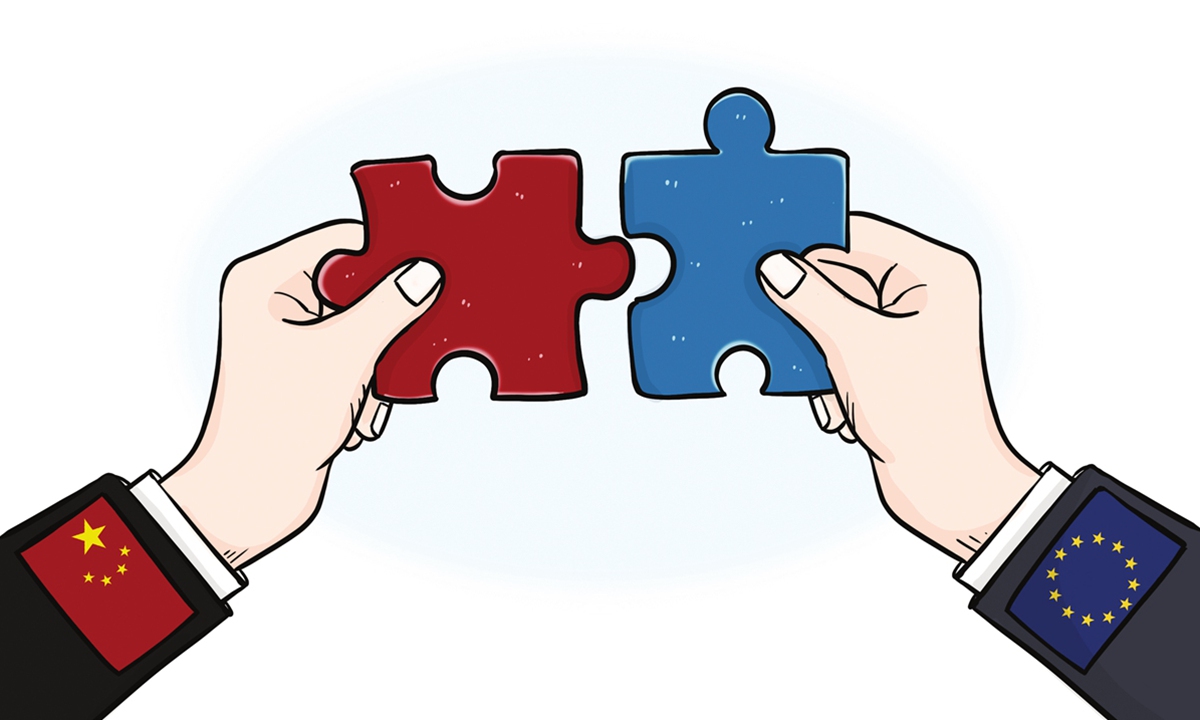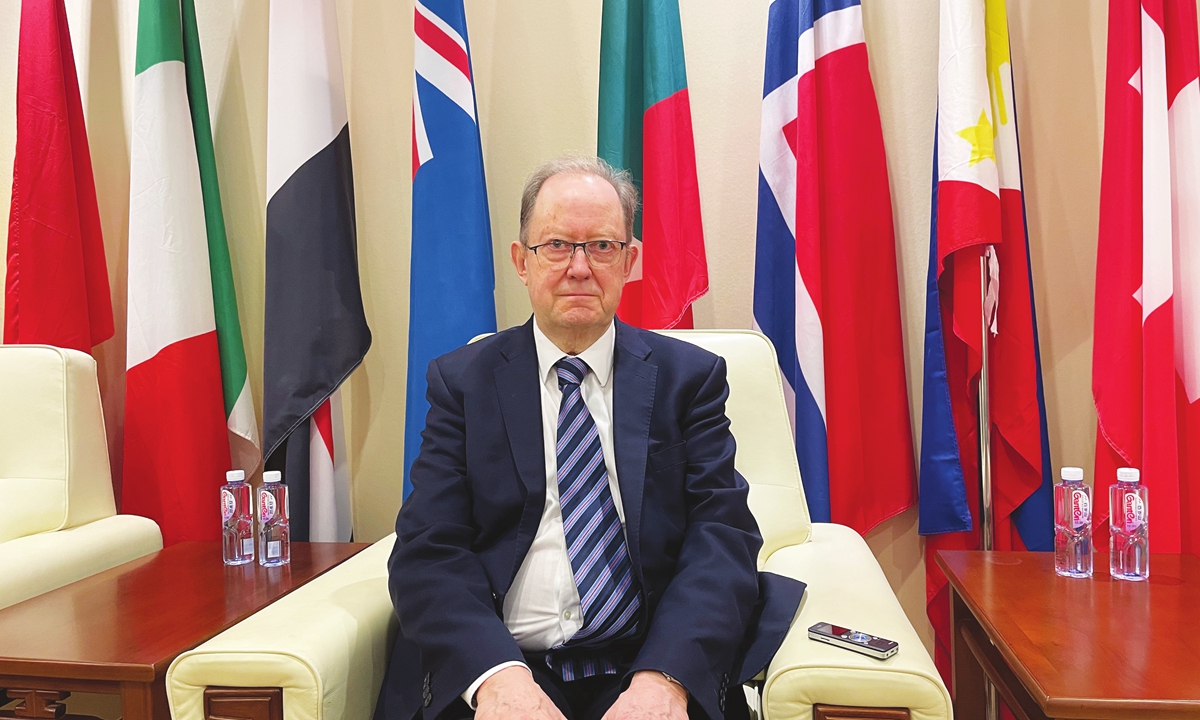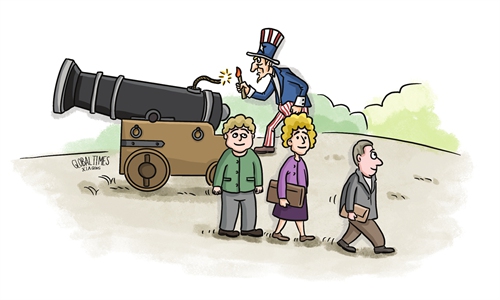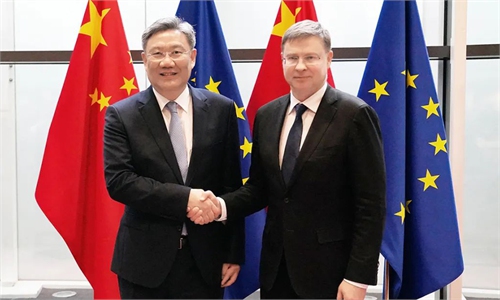
China EU relations
Editor's Note:
French President Emmanuel Macron's call for strategic autonomy of Europe has aroused a wide debate across the continent where the impact of the Ukraine crisis has been growingly far-reaching. When the European countries discuss about how to view and co-exist with China in a rational manner, there are also voices of opposition under the influence of the US. Global Times (GT) reporter Chen Qingqing interviewed John Ross (Ross), a senior fellow at Chongyang Institute for Financial Studies, Renmin University of China and former director of economic and business policy for the Mayor of London, on the ongoing debate in Europe, the UK-China relations and the US-China rivalry.
GT: During Macron's visit to China, he was accompanied by European Commission President Ursula von der Leyen. There are media reports comparing the two as "the warm embrace and the cold shoulder." How do you see von der Leyen's trip to China?
Ross: I think it was very accurate representation for two differences in Europe. From an economic point of view, Europe needs very good relations with China. But the US doesn't want this for geopolitical reasons, because it wants to weaken China.
Von der Leyen came to China and put forward basically the American position while Macron put forward the European economic position. I think the visit summarized the fight that is going on in Europe at the present time.
In two places, the outcome of what's referred to in the West as the new cold war is not yet decided. In most places in the world, we already know what the outcome will be. Asian developing countries won't go along with the US' cold war against China. China is now winning the Middle East and Africa. The US will win in North America. In Europe and Latin America, we don't know what the outcome will be.
GT: Macron emphasized the need for Europe to seek strategic autonomy after his visit to China, stating that he did not want to be dragged into the conflict between China and the US on the Taiwan question. What do you think are the key factors for Europe to seek strategic autonomy, and can it find a unified and balanced policy toward China?
Ross: I don't think it will find a unified one. I think that there will be differences. The differences are just too big. In Germany, there's a fight, because Germany is very dependent upon China economically. In France, you have a fight too. Some of the Eastern European countries like Hungary are very friendly toward China. I assume at the level of the European Union as a whole, there will be some sort of compromise. Britain will definitely follow the US. So I think China is going to have a rather complicated time for its diplomacy. China's diplomats in Europe will be very busy during the next 10 years, because there is going to be uneven developments with the situation.
China's policy is very simple - it wants good relations, but you are going to get totally different responses. You're going to get favorable responses from Macron, and you're going to get the unfavorable responses from von der Leyen. I'm afraid that's going to go on for some time.
GT: What issues or aspects do you think the US will strengthen its control over Europe in the future, so as to influence Europe's China policy? How should Europe respond?
Ross: It should say the US has created chaos in our continent; we are not going to follow it. We may have the same political system in Europe, but we've got chaos not because of the political system, but because Europeans have given in to the US. I think all the positive developments in the Middle East are because they don't want this type of chaos there. They want the Asian situation [peaceful economic development]. And the new factor in the situation is China.
The problem we have in Europe is that the European governments, instead of resisting the US, have gone along with US' policy, which has produced high inflation, slow growth and a big war. Europe needs to adopt the Asian-type attitude.

John Ross Photo:Chen Qingqing/GT
GT: The British foreign secretary has called for the UK to have a more constructive but robust relationship with China, but he also hyped on the Taiwan question. How do you see that?
Ross: [Former prime minister] Cameron had a very sensible policy toward China, which led to a "golden period" between Britain and China. Chinese companies and Chinese finance are going international. London is a great base for them to come and do it. This was a real win-win. This has been overturned by the US because the US doesn't want it.
What the UK officials said "we want good relationships with China, but we're going to internationalize the Taiwan Straits [question]" is completely stupid. It's all complete hypocrisy and nonsense. Unfortunately, they're engaged in a very provocative policy. They know perfectly well that Taiwan is an absolute red-line issue.
Right now, the Europeans are engaged in stupid and very dangerous things which are against their interests. And then they make hypocritical speeches saying that "this is not confrontation." I think that the Chinese people will laugh at it.
GT: How do you evaluate the Sunak government's policy toward China?
Ross: Very stupid. That would be my characterization. Britain has huge interests to have a good relationship with China. Most of the biggest businesses in the City of London financial center don't do much business with Britain, they chiefly operate internationally. This is fantastic for a win-win result that we could have with China. We have language advantage, we speak English, most Chinese people who speak foreign language speak English. We have a huge financial center. China wants to go international. It's much easier for Chinese companies to go international in Britain than in Germany or France because of language reasons. But we are messing up, and we're paying a big price for it. This is a completely stupid policy which is against the interests of British people.
GT: To what extent do you think Europe will cooperate with the US in continuing to challenge China on the Taiwan question? What do you think is the mainstream public opinion and perception in Europe regarding the tense situation in the Taiwan Straits?
Ross: I don't think that Europeans think that's a good idea to have confrontation over Taiwan. People are worried about it. European governments may pursue a dangerous policy for the US, but I don't think that the people are very concerned about it, because it's a really very easy question to understand: Taiwan is part of China. There's nothing to discuss. None of them dares to challenge the one-China principle openly. I think that European governments may become involved in some dangerous things, but the European population is not very keen on this.
GT: How do you view the current China-US relationship? Where do you think the "ice-breaking" point of China-US relations lies?
Ross: I think the present situation is bad. And I'm afraid the situation may get worse. The problem is that the US is losing the peaceful economic competition with China, the tariffs that had been imposed by [former president] Trump haven't worked, China does more trade with the US than before the tariffs. The number of high-tech Chinese companies is also increasing.
The danger is that the US has the most powerful military force in the world and they will try to solve problems by military means. Although I think a nuclear war between China and the US is still very unlikely, there are people in the US who want to have a war over Taiwan with the calculation that this would not become a nuclear war.
For many years, the US has attacked developing countries. This is unjust, immoral and I am against it. But those countries can't militarily reply to the US. Right now, the US has provoked a war with Russia in Ukraine. We should be clear that it's the desire to expand NATO into Eastern Europe that has really caused the Ukraine war. But Russia is not a developing country, it's a nuclear-armed, very powerful state. The US is prepared to risk a war, and this is something qualitatively new: prepared to risk a war with a major power, not with the developing country. That's a new dangerous thing.
As long as the US maintains its military supremacy, and it's weakening economically, there is a danger that someone will try to resort to military response.
I think the next 10 years will be unfortunately dangerous. Is there any possibility to change it? I think only with the great strength of China. So the only way is that when the US is weaker than China, it will become more friendly.
I agree with China's policy of being not aggressive, promoting peace and cooperation. But the reality is that if China's nuclear forces were stronger, the US would be less inclined to risk war. It is only the combination of China's increasing strength with China's peaceful policy that will lead to the US becoming more reasonable. That will take some period of time.
GT: In the short term, are there any chances for high-level interactions between China and the US?
Ross: There are two contradictory pressures in the US. The people from the business sector would like to restore good relations. Secretary of the Treasury Janet Yellen is more keen to have discussions with China. The foreign policy establishment is not so. I'm rather pessimistic about the short-term re-engagement, because it's determined by those long-term factors.
One of the scariest things in the US is how little they know about China. They think that China is very weak. They don't understand it at all. They have some idea that everybody in China thinks the same, they all speak the same. The average Chinese person knows 100 times as much as about the US as the average American knows about China.
GT: Is there a possibility to ease the Russia-Ukraine conflict?
Ross: From 1992 to 2000 I lived in Moscow. At that time, I advised companies and one of the most standard questions that they asked me was: Should we invest in Russia or Ukraine? I always said the same thing. I said, don't invest in Ukraine, there was going to be a war. Now I was wrong in the time scale. I thought that the war would start in 15 years, instead the war starts in 30 years.
The US government likes the war going on, because they think it weakens Russia. Therefore, they don't want the war to stop quickly. I very much support China's approach.
But I don't expect it to be accepted by the US, because the US controls Ukraine. It's not a war between Ukraine and Russia. The big support for China is just outside the US. It should continue to put it forward. It will take quite some time for it to be successful, but that shouldn't be a reason for not putting it forward.
GT: Can we see any possibility now for the US and Russia to sit down and talk?
Ross: Not in the short term, because the US has decided that it wants Ukraine to try to win the war. And not until the war solutions fail will they turn to negotiation. China can't force the war to end. All China can do is to put forward the right position. It should continue to put forward the right position, but I would not expect quick results.


